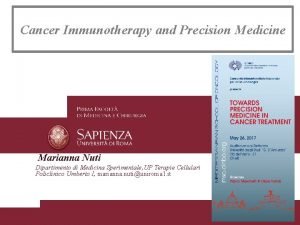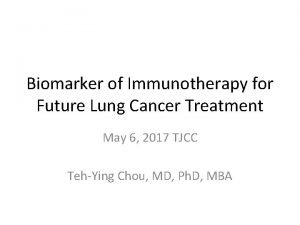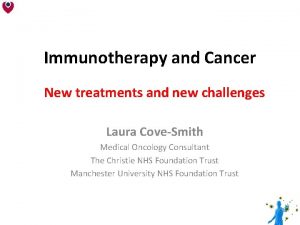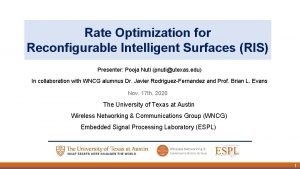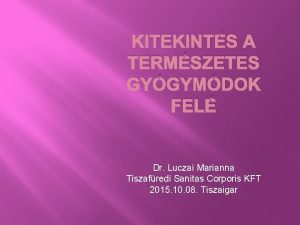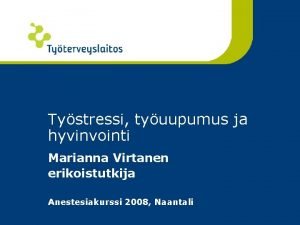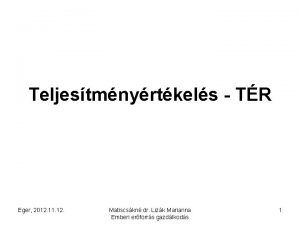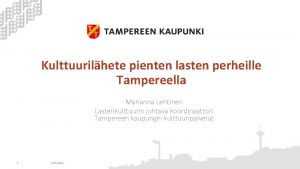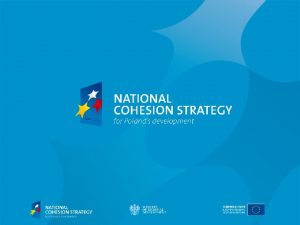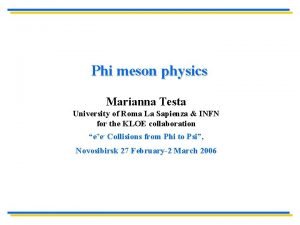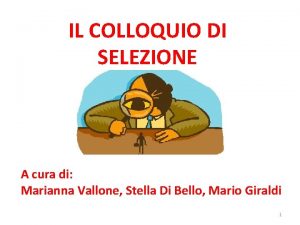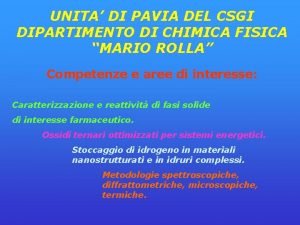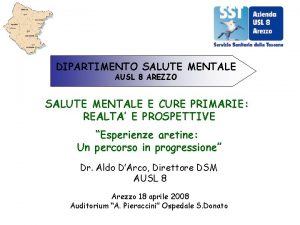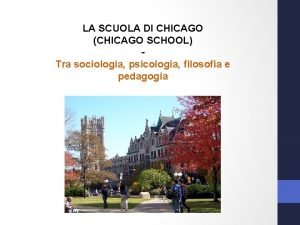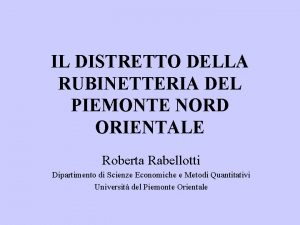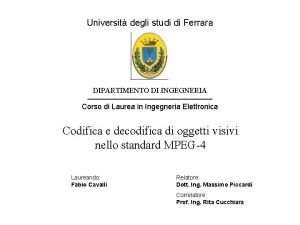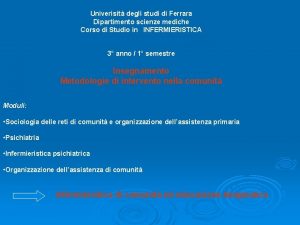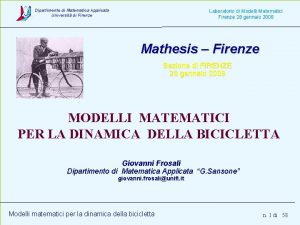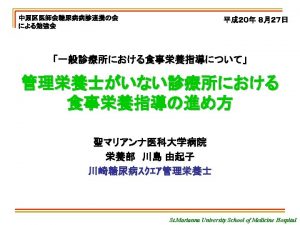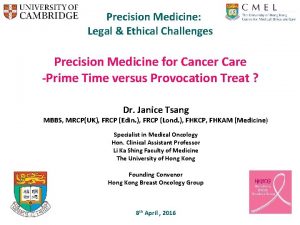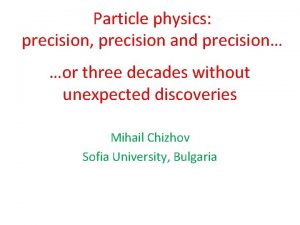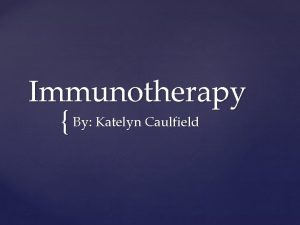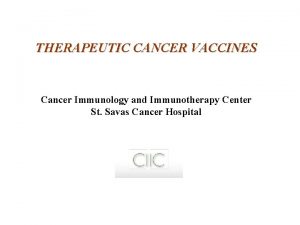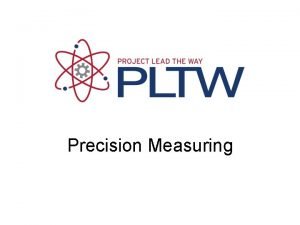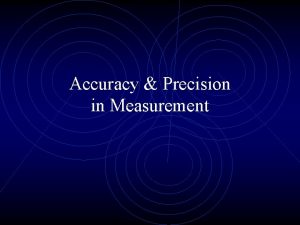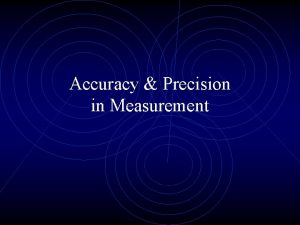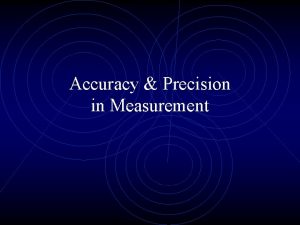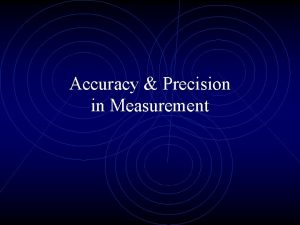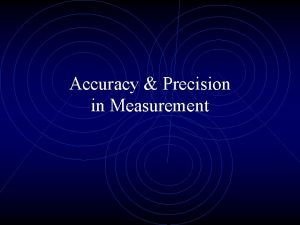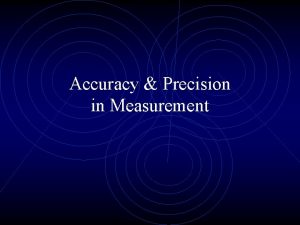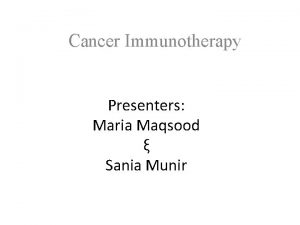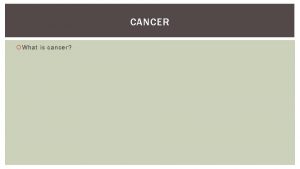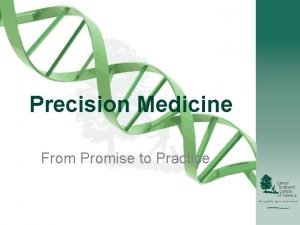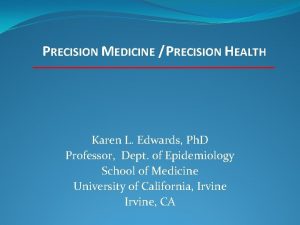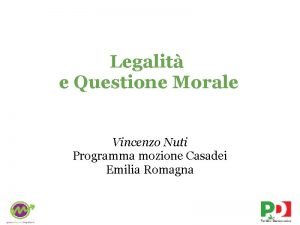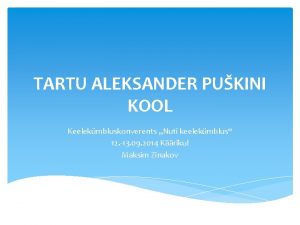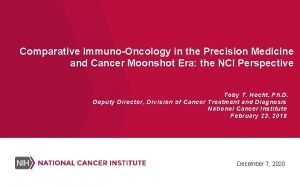Cancer Immunotherapy and Precision Medicine Marianna Nuti Dipartimento





































- Slides: 37

Cancer Immunotherapy and Precision Medicine Marianna Nuti Dipartimento di Medicina Sperimentale, UP Terapie Cellulari Policlinico Umberto I, marianna. nuti@uniroma 1. it Aggiornamenti sul tumore dell’ovaio Roma 16 dicembre 2010


August 19, 2010

Aggiornamenti sul tumore dell’ovaio Roma 16 dicembre 2010

CD 8 T cells Central memory CD 8 T cells Mlecnik et al. Jclin Oncol 2011; 29: 610

Dalla copertina di Science……. alla recente copertina del Time sull’impatto economico INCONTR AIOM 2016

Challenges for curing cancer today • It is not sufficient to “treat” the tumor • Treat the patient: individualized treatment • Immune system: unique repertoire of molecules and cells specialized to eliminate and control foreign material/sick cells/pathogens 6° MASTER in NEURO-ONCOLOGIA

Immunotherapy Targeted therapy Targets tumour Targets host Single agent immunotherapies cause slow-onset, durable responses Combination ? 6° MASTER in NEURO-ONCOLOGIA Single agent targeted therapies cause deep, rapid onset, but nondurable responses

The immune system • Unique repertoire of molecules and cells specialized to eliminate and control foreign material/sick cells/pathogens • Immune cells can “find” the target in all tissue discrict • Can be educated for recognition • Memory

IMMUNOTHERAPY: “universal” and “shared” therapies for different tumors • Immune system is active in all humans • All cancers can benefit from immunotherapy • The immune fitness of the patient is probably the best indicator of response to immunotherapy • Several factors contribute to immune fitness: microbiota, genetic factors, life style, neurological factors etc…



T cell the novel “drug”for treating cancer: T cells can clinically control cancer • First important evidence: T Lymphocytes can eliminate also large masses of tumor (1 Kg of tumor = 1012 cells) • Failure to achieve critical mass of T cells explains previous trials with disappointing results • Two potential solutions: - Infuse huge numbers of specific T cells - Activate small numbers of T cells in-situ (chemo/radio and target therapies) and expand them in large quantities (ICI)

T cell the novel “drug”for treating cancer: T cells can clinically control cancer • T cells can be “liberated” by immune-check point inhibitors • T cells can be adoptively transferred (car-T) • T cells can be induced in vivo by vaccination and/or chemo/radio therapies Palucka AK and Coussens LM, Cell 2016 6° MASTER in NEURO-ONCOLOGIA

New shapes of curves and new endpoints for clinical trials IDEAL KAPLANMEYER -Reduction in the risk of event is maintained proportional during the observation -Median Survival and HR are both good surrogate of treatment benfit TKIs KAPLAN-MEYER -Large benefit in favour of the experimental drug is captured entirely by the medians -No difference at the 12 -m landmark analysis is observed IMMUNO KAPLANMEYER -Medians do not capture the effect of the drug -Landmark analysis may be the best tool to magnify benefit that will be detected later in the study Pilotto S et al. Transl Lung Cancer Res

Future scenarios in immunotherapy treatment of cancer • Absolute need for combination of treatments • Novel “mentality” in designing treatment protocols and clinical trials • Patient personalized approach

Questions to be answered… Can immune biomarkers help? • Explain degree of heterogeneity in responses with ICI • How to extend ICI coverage to the majority of cancer patients who do not see control or regression of cancer (biomarkers of response and toxicity) • Should we start ICI treatment at diagnosis? Need of biomarkers of immune fitness (activation, suppression) • Should ICI treatment be continued beyond progression? Suspended? Otherapies to re-induce immunogenic death?

Biomarkers in immunotherapy: precision medicine in immunoncology • To identify early responders pts • To anticipate toxicity events • To monitor immunity during treatment • To stop immune therapy if ininfluent to response (not for resistance) • To tailor on the single pt the right schedule (precision immuno-oncology treatment)

Biomarcatori validati (più o meno…) • IMMUNOSCORE tissutale • Misura infiltrato immunitario, location infiltrato, può essere tipizzato grossolanamente: correla con prognosi • Possibile solitamente in partenza (tumore primario), non valuta dinamicità, manca di caratterizzazione specifica • MUTATIONAL LOAD • Per difetti riparo (MMRD) : ottima risposta con ICI • La valutazione non è in realtà utile ai fini clinici • IMMUNOMONITORING • Popolazioni cellulari periferiche indicative di attivazione e/o immunosuppression • Citochine-chemochine pro-anti-infiammatorie sieriche • Fondamentale personalizzazione e valutazione durante trattamento (per ora…) • BIOMARKERS NON IMMUNITY • LDH indice di high cell turnover e stress/hypoxia (LDH elevato correla con prognosi negativa) • Cell-free DNA, mi. RNA, exosomes

Immune related biomarkers: summary of findings related to response • T cells: q Increase in Absolute Lymphocyte count (ALC) , CD 4+ and CD 8+(Ki 67), low monocyte, low MDSC, high Treg (for IPI) q Pre existing primed CD 8+ T cells are maintained in long-term survivors (not naive converting to effectors…)…. reflects immunogenicity of tumor, capacity of that aplotype to present, rearrangements Tc. R q Association with low serum IL 15 (increased expression of TIM 3 and PD-1 on NK and T cells q High IL 4 and IFNgamma before IPI q High avidity T cell clones (example virus reactive , CMV), Less clonotype loss q ICOS upregulation after IPI, transcription factors EOMES and granzyme B + T cells Master di Immuno Oncologia 27 -29 Aprile 2017

Infiltrato infiammatorio NSCLC

B cells CD 8 T cells CD 4 T cells Confirmed by Djenidi et al. , J Immunol 2015 and Donnem et al. , Clin Cancer Res 2015

T cell the novel “drug”for treating cancer: evidences that T cells are involved also in determining the success of cancer therapies Therapeutic benefit from PD-1/PD-L 1 blockade requires “hindered” pre-existing immunity reinvigorated by the treatment

Il percorso per l’attivazione dei linfociti T anti tumore Presseur M. et al. , Nat Rev Neurology, 2015

Slide 13 Presented By Padmanee Sharma at 2016 ASCO Annual Meeting

Slide 22 Presented By Laura Chow at 2015 ASCO Annual Meeting

NEED TO EXPAND A SIGNIFICANT NUMBER OF SPECIFIC T CELLS Not all patients with an immunological response to pembro (anti-PD 1) have clinical benefit Huang, AC et al, Nature 2017

NEED TO EXPAND A SIGNIFICANT NUMBER OF SPECIFIC T CELLS 29 pts stage IV melanoma with prior anti-CTLA 4 treatment treated with PEMBRO • Most pts demonstrated immunological response ( CD 8 Tex cells Ki 67 pos) • Clinical failure due to: 1. Inability to induce immune reinvigoration 2. Imbalance between T cell reinvigoration and tumor burden • Magnitude of reinvigoration of circulationg Tex cells in relation to tumor burden correlates with clinical response Huang, AC et al, Nature 2017

ICI non responders/refractory pts are: • Pts with defects in IFN signaling • Pts with tolerogenic DC • Pts with defects in antigen presentation (beta-2 microglobulin) • Pts with unbalanced T-cell invigorating/tumour burden ratio ICI responders pts are: • Pts with high mutational load • Pts with defects in repair machinery • Pts with tumor-T cell inflammation

The cancer immunogram. Christian U. Blank et al. Science 2016; 352: 658 -660

T cell the novel “drug”for treating cancer: evidences that T cells are involved also in determining the success of cancer therapies CHEMOTHERAPY and TARGET THERAPY need an intact immune system to be efficacious

Designing Vaccines or re-invent chemo/target/radiotherapy protocols to increase specific anti tumor T cells trafficking to the tumor Nota bibliografica

Nivolumab OS: Prior sunitinib Nivolumab OS: Prior pazopanib Motzer RJ, ASCO 2016

Targeting dei recettori coinvolti nell’attivazione linfocitaria

CD 137 anti-TNF receptor 4 -1 BB: biomarker to identify naturally -occurring tumor reactive T cells in tumor • CD 137 is up regulated by TILs upon encounter with a tumor antigen • CD 137 in CD 8+ and CD 4+ T cells is MHC dependent • CD 137 expression identifies recently activated tumor specific T cells • Targeting del recettore con anticorpi agonisti in clinica: numerosi studi in fase 1, tossicità epatica • Targeting del recettore in studi di adoptive cell therapy per espansione T cells tumor specific

Added value of peripheral blood biomarkers: Take home message from initial immunomonitoring studies (…. real life) • Chance to monitor at different time points treatment induced changes • Peripheral blood biomarkers: a partial and dinamic picture strongly indicative of tumor immune scenario. Modifications of the repertoire /function of circulating immune cells is an early event ( earlier than tumor response) • Circulating cytokine and chemokine can anticipate the changes in target populations, can be alert of manifest immunesuppressive status, are indicators of activated recirculation and/or cross-talk of immune cells • All data should have a longitudinal setting per patient • We need to learn from our patients: …. longsurvivors, excellent responders, off-label etc… • Novel “mentality” in designing treatment protocols and clinical trials…Immunomonitoring guided trials

ALGORITHM of PATIENT SELECTION PARAMETERS FOR CANCER IMMUNOTHERAPY Botticelli , A. et al. 2017
 Marianna nuti
Marianna nuti Initinib
Initinib How to draw a motor bike
How to draw a motor bike Thyroidtitis
Thyroidtitis Difference between precision and non precision instruments
Difference between precision and non precision instruments Difference between precision and semi precision attachments
Difference between precision and semi precision attachments Negatif sayıların binary gösterimi
Negatif sayıların binary gösterimi Pooja nuti
Pooja nuti Ranuccio nuti
Ranuccio nuti Rita nuti
Rita nuti Leicester precision medicine institute
Leicester precision medicine institute Dr martin tobin
Dr martin tobin Precision medicine ecosystem
Precision medicine ecosystem Ethical issues in precision medicine
Ethical issues in precision medicine Dr luczai marianna
Dr luczai marianna Marianna virtanen
Marianna virtanen Marianna hoagies fundraiser order form
Marianna hoagies fundraiser order form Matiscsákné dr. lizák marianna
Matiscsákné dr. lizák marianna Lasse lehtinen perhe
Lasse lehtinen perhe Marianna kelly
Marianna kelly Marianna sidoroff
Marianna sidoroff Msc marianna
Msc marianna Meno marianna
Meno marianna Marianna grasso
Marianna grasso Msc marianna
Msc marianna Marianna testa
Marianna testa Marianna vallone
Marianna vallone Dipartimento chimica unipv
Dipartimento chimica unipv Relazione coordinatore di dipartimento
Relazione coordinatore di dipartimento Dsm arezzo
Dsm arezzo Dipartimento casa italia
Dipartimento casa italia Scuola di chicago criminologia
Scuola di chicago criminologia Nord (dipartimento)
Nord (dipartimento) Inail civita castellana
Inail civita castellana Unipr dipartimento economia
Unipr dipartimento economia Ingegneria ferrara
Ingegneria ferrara Dipartimento scienze mediche ferrara
Dipartimento scienze mediche ferrara Dipartimento di matematica firenze
Dipartimento di matematica firenze
